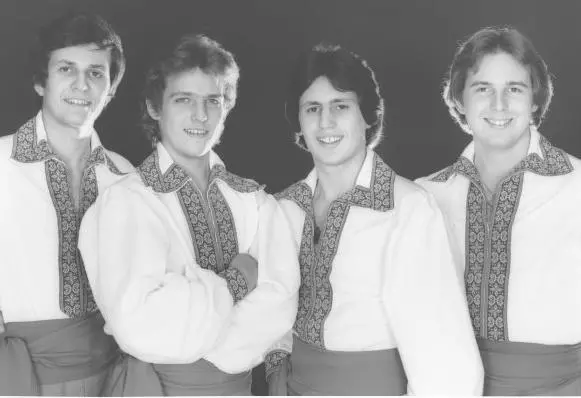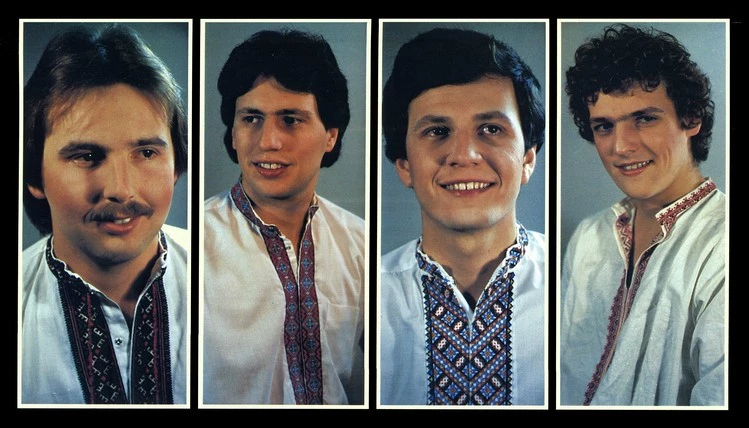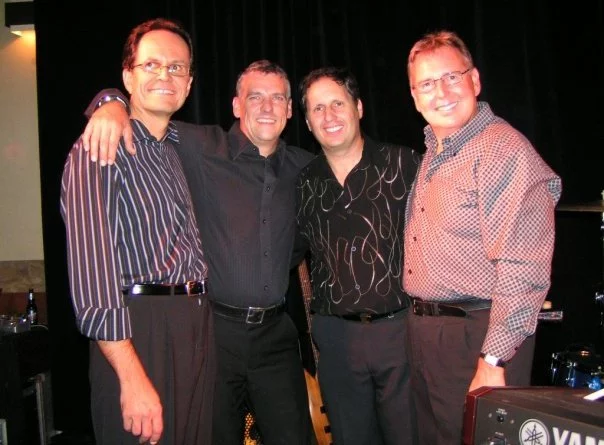
Ансамбль «Веселка»
Вокально-інструментальний ансамбль «Веселка» один із найвідоміших українських музичних гуртів у Канаді. Ансамбль організований у 1976 році у місті Монреаль.
Склад ансамблю:
• Андрій Чорній (Andrij Czerny) – акордеон, синтезатор, ксилофон, вокал
• Ігор Жовтоніжка (Ihor Zowtonizka) – соло та ритм гітара, вокал
• Роман Будний (Roman Budny)* – бас гітара, вокал
• Роман Коланич (Roman Kolanitch) – барабани, перкусія, вокал
• Василь Кінал (Wasyl (Bill) Kinal)** – бас гітара, акордеон, вокал
* Роман Будний у складі ансамблю до 1981 року.
** Василь Кінал у складі ансамблю з 1981 року.
З середині 70-х ансамбль грав на весіллях, вечірках, та інших забавах. Молоді талановиті музиканти вдало використовували нові музичні досягнення та тенденції, що сприяло швидкій популярності ансамблю. В репертуарі – українські народні пісні, українські пісні у поп-рокових та джазових обробках, власні твори.
У 1979 році директор канадського лейблу Yevshan Records Богдан Тимець організував запис та видання першої платівки ансамблю. Після успіху цієї платівки ансамбль виступав на багатьох музичних фестивалях у Канаді та здобув визнання серед широкої аудиторії.
Другу платівку із записами пісень «Веселки» видано у 1981 році. Популярність платівки перевершила успіх попередньої і стала однією з найпопулярніших платівок українських музичних гуртів Канади.
Музиканти ансамблю приймали участь у записі платівок інших гуртів, зокрема гурту Самоцвіт (перша платівка 1979 року), Сестер Тодащук (перша платівка 1983 року), Черемшина (друга платівка 1983 року), студійному проекті «Золоті ворота» (1980) та ін.
Творчість «Веселки» яскраво відображає розвиток української музика у Канаді. Від традиційного фольк-року «Рушничка» та «Синів степів» вона змінюється на поп-рок «Веселки». Майже десять років різниці між заснуванням цих гуртів, та власне музикою, обумовлюється загальним світовим розвитком рок-музики, але сутність залишається українською – романтизм, поетичність та гарний мелос.
Ансамбль «Веселка» і досі радує виступами своїх прихильників у Канаді.
Література:
1. «A Rainbow in search of a pot of gold… » B.Zacew. «Student», Canada’s newspaper for ukrainian students, January 1980.
2. «Direction in diversity… Vid dushi». B.Zacew. «Student», Canada’s newspaper for ukrainian students, April 1982.
3. A Winnipeg duet – Rosemarie and Charlene Todaschuk have recently released their very first album (rosemarietodaschuk.com).
4. Інтернет-ресурси: Veselka-132407930529 (facebook.com), Веселка (pisni.org.ua).
5. Інформація з обкладинок до платівок: «Веселка», «Черемшина», (Yevshan Records), «Від душі» (OKO LTEE).
__________
Веселка, вокально-інструментальний ансамбль | Веселка | Veselka – Vocal and instrumental ensemble | Veselka

«Веселка», 1979 
«Веселка», 1981 
«Веселка», 2010